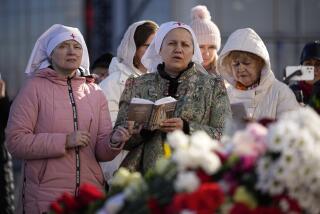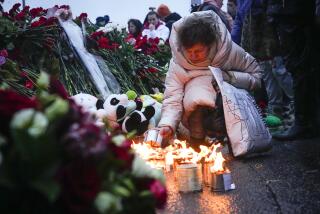NEWS ANALYSIS : Overconfident Yeltsin Is Caught by Surprise
- Share via
MOSCOW — On a lovely Indian summer Sunday, President Boris N. Yeltsin lost control of the streets of his capital and, it seemed for a time, of the capacity to rule Russia.
The downturn in Yeltsin’s fortunes was breathtakingly swift. His position improved markedly with the arrival of paratroopers and armor in the city’s heart early this morning. But Sunday’s dramatic, violent events on Moscow thoroughfares were a terrible blow to his contested presidency, due in part to miscalculations and overconfidence by the president and his advisers.
On Saturday morning, Yeltsin clambered out of his Zil limousine to survey the Russian Parliament building, the besieged riverside headquarters of his adversaries, and give a pep talk to the police officers ringing it. By Sunday evening, many of those officers had taken flight, and Russia’s 62-year-old leader was hunkered down inside the Kremlin, protected by its thick brick walls and by the army detachments that came to his aid.
“The fate of Russia, the fate of our children is being decided today,” Yeltsin said in a statement. “Violence, civil war will not succeed if we stand in their way.”
His office had announced a televised address to the nation, but as a symptom of his ebbing fortunes, the broadcast center in northern Moscow was attacked by anti-Yeltsin forces equipped with launchers and submachine guns, and the president could not go on the air.
Anatoly Sobchak, mayor of St. Petersburg, said Russia had arrived at the same momentous juncture as in 1917, when the battleship Aurora fired a shot that unleashed the Bolshevik attack on the ill-fated Provisional Government and spawned the creation of Soviet Russia.
Why was Yeltsin thrown on the defensive so blindingly fast? Many questions were still without answers as night fell Sunday. Yeltsin may have been lulled into a false sense of security by the negotiations with his enemies brokered by prelates of the Russian Orthodox Church, which led Saturday to a tentative agreement on how to defuse the armed standoff that began Sept. 21 around the Russian Parliament.
On Saturday, demonstrators and the special anti-riot police known as the OMON clashed violently on Moscow’s major thoroughfare, the Garden Ring Road. The protesters appeared vastly outnumbered, by about 300-400 to 4,000-5,000. Last week, hard-line parliamentarian Vitaly Urazhtsev moodily estimated the correlation of forces at “90 to 10” in the Parliament’s disfavor and said he expected an attack by pro-Yeltsin forces on its building.
On Sunday, heartened by the humiliating rout earlier in the day of law enforcement detachments supposedly loyal to Russia’s government, Urazhtsev was brashly predicting victory: “No one can fool world opinion any longer that Yeltsin, former president of the Russian Federation, has any support in this country.”
One of Russia’s former deputy premiers, economist Grigory Yavlinsky, contrasted the struggle for power with the hard-line Communist attempt to seize power two years ago and concluded last week, “I am afraid that if the coup in 1991 started as a tragedy and ended like a comedy, just now it looks more and more like it started like a comedy and may finish in tragedy.”
Those tragic hours came Sunday as Moscow was rocked by its worst politically motivated violence and bloodiest unrest since the Russian Revolution.
What happened? For one, Yeltsin’s adversaries proved more ready to resort to force than he was, and they obviously knew it. The Russian president had given his enemies until today to disarm and clear out of the Parliament building, known as the White House, but vowed publicly that there would be no bloodshed.
Yeltsin’s former running mate, Alexander V. Rutskoi, proclaimed Russia’s acting president by the conservative Parliament, had little compunction about calling Sunday for attacks on TV headquarters and the Moscow’s mayor’s office.
In the resulting disorder, Moscow Mayor Yuri Luzhkov said anti-government “bandits” killed two police officers and two Interior Ministry soldiers, and in the fierce paramilitary assault on Moscow’s TV center alone, still continuing as of 1 a.m. Moscow time this morning, one report said eight people were killed and 100 wounded.
Russia’s most dyed-in-the-wool Communists have lampooned the aged authors of the failed 1991 putsch for being too lily-livered to spill the blood of their opponents and for lacking the “will to power” that is an indispensable ingredient of Leninist political doctrine. The fomenters of Sunday’s events talked a much tougher game.
“We have to take the Kremlin,” Supreme Soviet Chairman Ruslan I. Khasbulatov said at one point. Some Russian political observers say they are convinced that even hotter heads than Rutskoi’s and Khasbulatov’s now prevail inside the White House.
Despite the dress rehearsal the previous day on the Garden Ring Road, Moscow authorities were manifestly unprepared for the marches and violent resistance that overwhelmed them Sunday. Even Yeltsin reportedly had left the city for his country home to the west and returned to the Kremlin only when it was obvious that his presidency was in mortal danger.
And yet, Ilya V. Konstaninov, co-chairman of the rabidly anti-Yeltsin National Salvation Front, had made no secret Saturday that big events were planned for the morrow, as he told his followers to disband and get some rest so they could turn out again Sunday.
A war of attrition has been the strategy some of Yeltsin’s foes had counseled all along.
Yuri V. Golik, a former Soviet lawmaker affiliated with the neo-Communists, predicted last week that the Yeltsin camp would not be able to wear down the Parliament in a standoff. According to Golik, the August, 1991, putsch showed that 120,000 to 150,000 soldiers and police officers were necessary to enforce the government’s rule in Moscow.
Golik claimed that the Russian president and his supporters could muster no more than 15,000 to 17,000 and said they would eventually grow tired.
When the crunch came, many police were not able or willing to use their weapons. The shock of Sunday’s events was seeing police time and again forced back by phalanxes of demonstrators, especially from positions near the Russian Parliament building. Rioters even wrested shields from demoralized police and Interior Ministry troops, or trapped the young men inside their buses.
Some officers stood their ground and fought with truncheons or fired bird shot, but in general, the police lines seemed to crumble like the rind of a rotten melon.
It wasn’t until later in the day that the Russian government started talking tough. “The government is compelled to use force to terminate the actions of political adventurists,” it said in a statement.
The conclusion from Sunday’s events may be that Yeltsin can no longer count on rank-and-file police officers or soldiers to bust the heads of other Russians for him, even if their leaders have pledged their loyalty. Today, Yeltsin’s enemies can be expected to test the dedication of the paratroopers who have been brought to Moscow. Yeltsin’s foes will be trying to see if the troops are as loyal as Defense Minister Pavel S. Grachev, or if they can be persuaded of the rival legitimacy of the country’s duly elected Parliament and vice president.
Finally, in what seems like an inexplicable oversight, even obvious targets for the Parliament’s supporters were insufficiently fortified or guarded, starting with the Moscow mayor’s building next to the White House. On Sunday, the Ostankino broadcast complex was besieged by supporters of Parliament, and the country’s two main channels--Ostankino and Russian TV--had to go off the air. Inside the main building, about 200 riot police and Interior Ministry troops, armed with short-barreled Kalashnikovs and wearing bullet-proof vests and helmets, braced for the attack.
More to Read
Sign up for Essential California
The most important California stories and recommendations in your inbox every morning.
You may occasionally receive promotional content from the Los Angeles Times.













